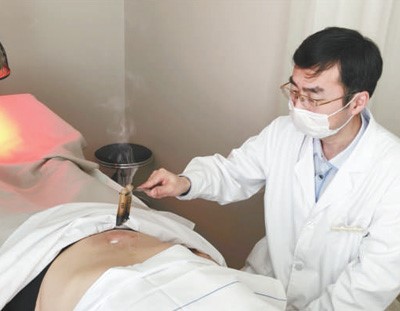Traditional Chinese medicine (TCM) has made its way to 183 countries and regions around the world, contributing to the improvement of public health across the world.

A doctor treats a patient with moxibustion therapy in St. Petersburg TCM Center, Beijing University of Chinese Medicine, July 11. (Photo/Courtesy of St. Petersburg TCM Center, Beijing University of Chinese Medicine)
Currently, China has signed TCM cooperation agreements with over 40 foreign governments, regional competent agencies and international organizations.
As TCM has played an effective role in treating COVID-19 patients in China, the country is willing to share its experience using TCM in epidemic prevention and control with the international community.
Established by the Beijing University of Chinese Medicine (BUCM), the St. Petersburg TCM Center is the first TCM hospital acknowledged by the local government in Russia. Doctors’ excellent medical skills in the center have attracted many local patients to come to the center to receive treatments.
Svetlana is a resident who was plagued by dizziness, headache, fatigue, and pain in her shoulders and arms. Though she received some oral medicines and intravenous injections from a local neurologist, the results were not encouraging enough.
When her husband advised her to receive treatment at the TCM center, Svetlana took it with a grain of salt at first. However, the acupuncture and cupping treatment in the center delivered real benefits to her. “My condition significantly improved after receiving the treatment three times, and my dizziness disappeared and the pain was greatly relieved after the sixth time,” she said.
TCM experts in the center have cured a large number of patients with intractable diseases by prescribing TCM therapies and methods, such as acupuncture, heat-sensitive moxibustion, and tuina (massage), winning high praise and recognition from locals.
Since its inauguration on July 3, 2016, the center has received over 4,000 patients, achieving good results in treating 30 types of diseases, including IGA nephropathy, atopic dermatitis, myasthenia gravis and cerebral palsy, as well as symptoms pertaining to pain in the neck, shoulder, waist and legs.
As the COVID-19 pandemic is still raging in Russia, the BUCM has actively organized online lectures on pandemic prevention, recorded related videos and trained TCM practitioners by relying on the St. Petersburg center. The university also formulated a TCM plan for health management amid the pandemic in both Chinese and Russian, which was issued by the Chinese consulate general in St. Petersburg, providing professional TCM anti-pandemic guidelines for the Russian people and the Chinese community there.
Over the past four years, the center has carried out sound exchanges and cooperation with several medical institutions and relevant research and teaching institutions in Russia. They have also launched training courses on TCM therapies, methods and theory, while establishing clinics to treat patients with intractable diseases through the combined use of TCM and Western medicine.
TCM is also popular in Hungary. “The Semmelweis University in Hungary and Heilongjiang University of Traditional Chinese Medicine in northeast China have worked together to train TCM talents since 2010, and the two universities began to set up the China-CEEC (Central and Eastern European Countries) Traditional Chinese Medicine Center (Hungary) in 2017,” said Yu Funian, head of the center.
“The center has cultivated many local TCM talents, playing a unique role in promoting TCM culture,” Yu noted, adding that over 3,000 doctors in the country have received acupuncture training and about 600 doctors have opened TCM clinics.
The TCM community in Hungary has also collected anti-virus supplies and shared China’s experience in the fight against the COVID-19 pandemic. A Chinese TCM doctor offered people free herbal tea in Budapest to boost their immunity. Coordinated by the TCM center and TCM associations in Hungary, a batch of anti-virus supplies, mainly comprising Chinese medicinal products, were delivered to the European country.
Former Hungarian Prime Minister Medgyessy Peter said one of the important reasons behind China’s remarkable anti-epidemic achievements lies in the combined use of TCM and Western medicine.
Meanwhile, a similar TCM center was established in Mauritius. The China-Mauritius Center for Traditional Chinese Medicine opened in 2019, becoming the first platform to promote TCM in Africa.
The Shanghai Yueyang Hospital of Integrated Traditional Chinese and Western Medicine is behind the center’s construction. The hospital and Shanghai Caitongde Pharmaceutical Co., Ltd. have staffed two experienced TCM doctors and one TCM pharmacist at the center.
Since its operation, the center has attracted many patients, including some from South Africa. Amid COVID-19 prevention and control in Mauritius, the center has managed to maintain regular operation, while launching lectures on pandemic prevention and answering dozens of questions through a telemedicine platform every day, providing medical support for local people, Chinese-funded institutions and companies, and the Chinese community.
(People's Daily Online)







